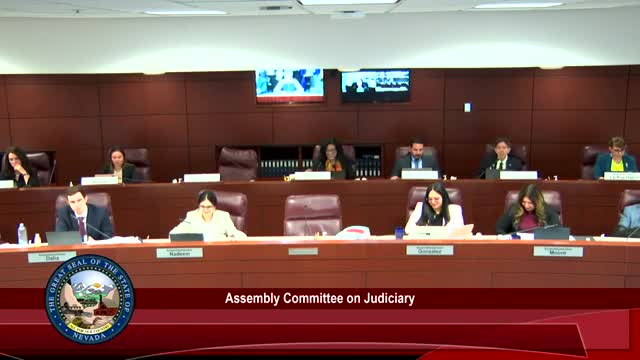Committee weighs AB 55 to update crash reporting and broaden coroner toxicology testing
Get AI-powered insights, summaries, and transcripts
Subscribe
Summary
Assembly Bill 55 would require coroner toxicology reporting to include commonly abused drugs and align Nevada crash reporting timelines and electronic reporting with federal FARS requirements; coroners and traffic safety staff told the committee the changes codify current practice and remove impractical statutory timelines.
Assembly Bill 55 would amend Nevada statutes to broaden toxicological testing and reporting for deceased motor‑vehicle‑crash victims and clarify electronic crash‑reporting timelines and the Nevada Department of Transportation’s role in statewide crash data. Amy Davey, director of the Nevada Office of Traffic Safety, told the Assembly Judiciary Committee the bill codifies current practice used to meet federal reporting standards, including the Fatality Analysis Reporting System (FARS).
"There are 2 primary components to AB 55," Amy Davey said: adding drug toxicology testing and reporting for crash victims, and clarifying methods and timelines for crash reports while recognizing NDOT as a primary stakeholder in the safety‑data partnership. Davey presented data showing that for a full year of records the state received toxicology testing in roughly 90 percent of deceased crash‑victim reports and said proposed changes would align statute with practice and federal requirements.
Medical‑examiner witnesses told the committee the proposal reflects current workflows. "Our office already performs more complete, testing that is relevant to drugs that are currently being abused, than are specified in law," said Dr. Laura Knight, chief medical examiner and coroner for the Washoe County Regional Medical Examiner's Office. Melanie Rouse, director of the Clark County Coroner's Office, agreed and said accreditation standards already require post‑mortem testing in many cases. Both witnesses and the sponsor urged replacing an outdated statutory list of "prohibited substances" with language — discussed in amendments — that would allow coroners to order panels reflecting modern drug trends such as fentanyl and other opioids. Presenters and coroners also urged removing the statutory 8‑hour testing requirement and a 30‑hour reporting deadline, saying those timelines are not practicable and do not reflect current laboratory or scene realities.
The bill would also acknowledge that the Department of Public Safety uses an electronic crash reporting system and that crash reporting begins within 10 days after the crash or a victim’s death to satisfy federal early‑notification requirements. Davey said naming the Nevada Department of Transportation as a collaborator in statute would formalize an existing data partnership: NDOT updates state street files, assists with geolocation, and consumes crash data for safety analysis.
Committee members asked technical questions about workload and lab capacity. When Assembly Member LaRue Hatch asked if broader toxicology panels would increase workload, Dr. Knight replied that Washoe County already performs testing for relevant abused drugs and that the bill would bring statute into conformity with existing practice. Amy Davey noted Nevada lacks a centralized forensic toxicology laboratory and relies on local coroner labs; that reality affects data collection for non‑fatal testing. Dr. Knight also addressed concerns about post‑mortem timing and results, saying: "The difference between 8 hours and 24 hours and even 36 hours is not a big difference," because metabolic breakdown ceases at death and coroners account for post‑mortem redistribution when interpreting results.
Clark County said it was technically in opposition under committee rules but is working with the sponsor on amendments; no organized opposition was recorded. Presenters closed by thanking the committee and the coroner offices for testimony. The committee received no vote at the hearing; presenters said they provided an amendment package addressing timelines and the definition of substances.
